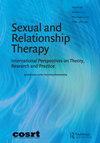日常积极沟通与性欲和满意度之间的联系:一种利用传统分析和机器学习的方法
IF 1.4
4区 心理学
Q3 PSYCHOLOGY, CLINICAL
引用次数: 0
摘要
摘要沟通是许多健康的性和浪漫关系的重要组成部分。积极的沟通策略,包括表达喜爱和感情,相互赞美,向伴侣透露自己的信息,与关系和性满意度有关,但对其与性欲的关系知之甚少。目前大多数文献使用传统的统计分析,假设误差是正态分布的,变量之间的关联是线性的。我们的研究旨在调查246对异性恋夫妇(N = 492)中四种积极沟通策略的日常水平与关系满意度、性满意度和性欲的关系。我们执行了传统的分层线性建模和机器学习,以提供不同数据分析技术的结果的互补视图。研究结果表明,每天从伴侣那里得到的积极沟通与当天以及随后几天夫妻双方感兴趣的所有结果变量相关。所有积极的沟通策略都预测了个人每天的欲望水平、性满意度和关系满意度,每种策略都与伴侣的结果有独特的联系。利用机器学习发现了独特的非线性相互作用。研究结果对研究人员和从业人员具有启示意义。我们发现,当一个人报告说在某一天从他的恋人那里得到了积极的交流(喜欢、喜爱、赞美和亲密的倾诉),那一天双方都有更高的欲望和满足感。夫妻可以通过积极的沟通来提高他们的性生活和关系生活。关键词:欲望满意度性机器学习积极沟通数据共享声明由于本研究的性质,本研究的参与者不同意公开分享他们的数据,因此无法获得支持数据。披露声明作者未报告潜在的利益冲突。本研究由帕蒂·布里斯本妇女性健康基金会资助。本文章由计算机程序翻译,如有差异,请以英文原文为准。
Associations between daily positive communication and sexual desire and satisfaction: an approach utilizing traditional analyses and machine learning
AbstractCommunication is an important component of many healthy sexual and romantic relationships. Positive communication strategies including expressing fondness and affection, exchanging compliments, and disclosing information about oneself with a partner are associated with relationship and sexual satisfaction, but less is known about its association to sexual desire. Most of the current literature has used traditional statistical analyses that assume errors are normally distributed and that associations between variables are linear. Our study aimed to examine the ways daily levels of four positive communication strategies are associated with relationship satisfaction, sexual satisfaction, and sexual desire among 246 mixed sex couples (N = 492). We performed both traditional hierarchical linear modeling and machine learning to provide a complimentary view of results from the different data analytic techniques. Findings indicated that daily positive communication received from a partner was associated with all outcome variables of interest that day as well as for subsequent days for both partners in the couple. All positive communication strategies predicted daily levels of desire, sexual satisfaction, and relationship satisfaction for the individual and each had unique associations with partner outcomes. Unique nonlinear interactions were found using machine learning. Findings have implications for researchers and practitioners.Lay SummaryWe found that when a person reports receiving positive communication from their romantic partner (fondness, affection, compliments and intimate disclosure) on a given day, both partners have higher levels of desire and satisfaction on that day. Positive communication can be practiced by couples to enhance their sexual and relational lives.Keywords: Desiresatisfactionsexualmachine learningpositive communication Data sharing statementDue to the nature of this research, participants of this study did not agree for their data to be shared publicly, so supporting data is not available.Disclosure statementNo potential conflict of interest was reported by the authors.Additional informationFundingThis study was funded by the Patty Brisben Foundation for Women’s Sexual Health.
求助全文
通过发布文献求助,成功后即可免费获取论文全文。
去求助
来源期刊

Sexual and Relationship Therapy
PSYCHOLOGY, CLINICAL-
CiteScore
3.80
自引率
9.10%
发文量
37
期刊介绍:
Sexual and Relationship Therapy is a leading independent journal in its field, well established and internationally recognized. It offers an active, multidisciplinary forum for review and debate across the spectrum of sexual and relationship dysfunctions and therapies. The journal presents original research and best practice and is a vehicle for new theory, methodology, and application. Sexual and Relationship Therapy is edited by a respected international team and publishes contributions from around the world. It is the official journal of the British Association for Sexual and Relationship Therapy (BASRT).
 求助内容:
求助内容: 应助结果提醒方式:
应助结果提醒方式:


